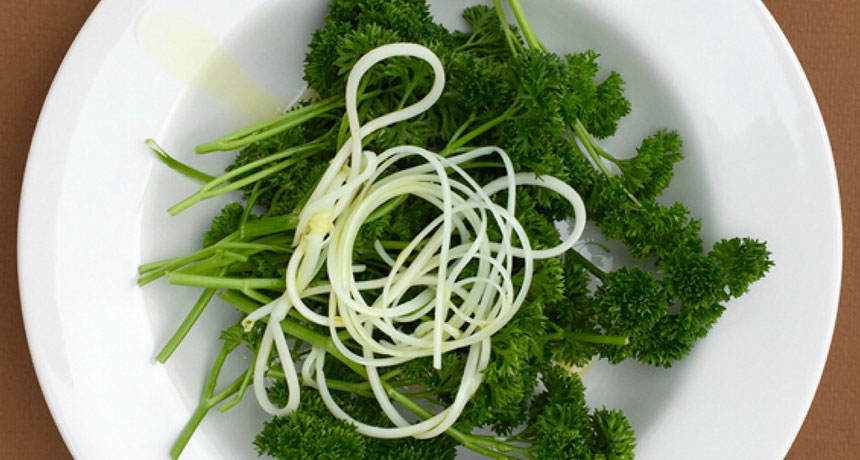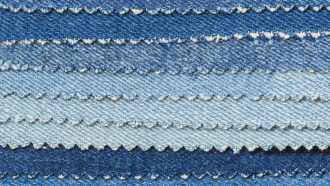Olive oil untangles plastic
Vegetable oils help make super strong fibers

Olive oil isn’t just for spaghetti. It can make super-strong plastics — like these polyethylene fibers — even stronger.
American Chemical Society
Chefs often add olive oil to spaghetti to aid the cooking process and improve flavor. Now a study finds that olive oil and other vegetable oils can also help make one type of plastic into super-strong fibers. Those fibers are ideal for making products such as bulletproof fabrics or ropes that anchor offshore oil rigs.
All plastics are made of long, spaghetti-like chains of molecules called polymers. One particular polymer has super-long strands. This lightweight plastic is often used in garbage bags and other household products. It’s a type of polyethylene (Pah-lee-ETH-uh-leen), or PE. The chemical’s name is a mouthful: ultra high molecular weight polyethylene. Molecules of this plastic are more than 20 times as long as those in other polyethylenes.
“These are gigantic molecules,” notes Theo Tervoort. He’s a materials scientist who worked on the project at the Swiss Federal Institute of Technology in Zurich.
Those super long molecules are very strong. But the process for making them led them to tangle. You might think of them as being similar to a plate of spaghetti with lots of jumbled strands. Those long molecules must be straightened out and stretched before they’re turned into the fibers that can be woven into some fabric or braided into ropes. That’s where olive oil or other vegetable oils can help.
If you wanted to untangle a plate of spaghetti, you could drop the noodles into a big pot of water. The strands would spread apart. Factories that make fibers from the extra-long PE molecules now do something similar. But instead of water, they use fast-evaporating solvents.
Mixing the PE in a solvent untangles the strands, says Tervoort. Afterward, the PE strands are heated and stretched. “During the stretching, all the chains go nicely in one direction,” he says. That makes long, strong strands of the plastic. At the end of that process, the solvent simply evaporates.
But that’s a problem. Breathing in the solvent fumes can irritate a worker’s lungs or cause other health problems, including some cancers. The fumes also can help cause smog. So factories need to capture the fumes and recycle the solvent.
Despite those problems, these solvents have been part of the special-PE fiber-making process for about 40 years. “Everybody was doing it,” Tervoort says. “Sometimes the simplest thing,” he says — “you don’t question anymore.”
The inspiration
Tervoort and his co-workers stumbled onto using oils on plastic while trying to develop a better type of wax for skis. Applying melted wax helps skis glide more smoothly over snow. But rubbing the wax on is awkward and messy. Tervoort’s group added some of the extra-long PE molecules to the wax. They figured they could then make the wax into a film. That would be easier to put on skis. To their surprise, the wax straightened out the tangled PE molecules they were using.
Wax is a type of oil. So the group tried using oils instead of solvents to make strong, straight PE fibers. Olive oil and peanut oil both worked. So did stearic acid. That chemical is a big part of many animal and vegetable fats.
The researchers described their findings November 30 in the journal Macromolecules.
The veggie oils are safer and better for the environment than the solvents are. Using them is also more efficient. The PE stretches more during that step of the process. And that leads to longer fibers. “You actually get better fibers,” Tervoort says. His team’s finished PE fibers were up to twice as strong as other PE fibers that were untangled using solvents.
It’s still unclear just why the vegetable oils work better. One idea: Maybe they change how the PE forms crystals as it turns into a solid. “That’s what we’re looking at now,” Tervoort says.
The discovery of a new, more environmentally friendly way to make a commonly used polymer illustrates something important about science, says Jeffery White. He’s a polymer scientist at Oklahoma State University in Stillwater who did not work on the study. The discovery by Tervoort’s team’s “follows decades of very basic research” about molecules, says White. “So, a new technology is created because of curiosity-driven research asking [one of] the most fundamental of questions: ‘Why do things work this way?’”
This is one in a series presenting news on invention and innovation, made possible with generous support from the Lemelson Foundation.







